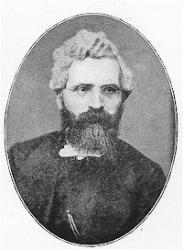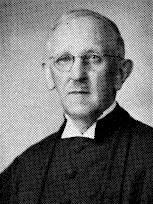Planning worship?
Check out our sister site, ZeteoSearch.org,
for 20+ additional resources related to your search.
- |
User Links
Person Results
Ieuan Gwyllt

1822 - 1877 Person Name: John Roberts, 1822-1877 Meter: 8.7.8.7.8.8.7 Composer of "RHEIDOL" in Trinity Hymnal Bardic name (pseudonym) of John Roberts. See also Roberts, John. He published a book of his tunes, Llyfr Tonau Cynulleidfaol, in London, England, in 1859.
Ieuan Gwyllt
Johann Walter
1496 - 1570 Person Name: Johann Walther Meter: 8.7.8.7.8.8.7 Composer of "DE PROFUNDIS" in American Lutheran Hymnal Johann Walther (b. Kahla, Thuringia, Germany, 1496: d. Torgau, Germany, 1570) was one of the great early influences in Lutheran church music. At first he seemed destined to be primarily a court musician. A singer in the choir of the Elector of Saxony in the Torgau court in 1521, he became the court's music director in 1525. After the court orchestra was disbanded in 1530 and reconstituted by the town, Walther became cantor at the local school in 1534 and directed the music in several churches. He served the Elector of Saxony at the Dresden court from 1548 to 1554 and then retired in Torgau.
Walther met Martin Luther in 1525 and lived with him for three weeks to help in the preparation of Luther's German Mass. In 1524 Walther published the first edition of a collection of German hymns, Geystliche gesangk Buchleyn. This collection and several later hymnals compiled by Walther went through many later editions and made a permanent impact on Lutheran hymnody.
Bert Polman
================
Walther, Johann, was born in 1496 at a village near Cola (perhaps Kahla, or else Colleda, near Sachsenburg) in Thuringia. In 1524 we find him at Torgau, as bassist at the court of Friedrich the Wise, Elector of Saxony. The Elector Johann of Saxony made him "Sengermeister" (choirmaster) in 1526. When the Electoral orchestra (Kapelle) at Torgau was disbanded in 1530, it was reconstituted by the town, and in 1534 Walther was also appointed cantor (singing-master) to the school at Torgau. On the accession of the Elector Moritz of Saxony, in 1548, Walther went with him to Dresden as his Kapellmeister. He was pensioned by decree of Aug. 7, 1554, and soon after returned to Torgau, still retaining the title of "Sengermeister." He died at Torgau, perhaps on March 25, or at least before April 24, 1570. (Monatshefte für Musikgeschichte, 1871, p. 8, and 1878, p. 85; Archiv für Litteraturgeschichte, vol. xii., 1884, p. 185; Dr. Otto Taubert's Pflege der Musilz in Torgau, 1868, and his Gymnasial Singe-Chor zu Torgau, n.d., 1870, &c.)
Walther was more distinguished as a musician than as a hymnwriter. In 1524 he spent three weeks in Luther's house at Wittenberg, helping to adapt the old church music to the Lutheran services, and harmonising the tunes in five parts for the Geystliche gesangk Bucklyn, published at Wittenberg in 1524. He was also present in the Stadtkirche at Wittenberg, when, on Oct. 29, 1525, the service for the Holy Communion, as rearranged by Luther and himself, was first used in German. His hymns appeared mostly in his Das christlich Kinderlied D. Martini Lutheri, Erhalt uns Herr, &c. Auffs new in sechs Stimmen gesetzt, und rait etlichen schönen Christlichen Texten, Lateinischen und Teutschen Gesengen gemehrt, &c, Wittenberg.
Those of Walther's hymns which have passed into English are:—
i. Herzlich Lieb hab ich dich, mein Gott. Trinity Sunday. First published in 1566 as above, and thence in Wackernage, iii. p. 204, in 4 stanzas of 8 lines. Translated as:—
0 God, my Rock! my heart on Thee. This is a good translation of stanza i., iii., iv., by A. T. Russell, as No. 133 in his Psalms & Hymns, 1851.
ii. Herzlich thut mich erfreuen. Eternal Life. First published separately, in 33 stanzas, at Wittenberg, in 1552, entitled "A beautiful spiritual and Christian new miner's song, of the Last Day and Eternal Life" [Konigsberg Library]. Thence in Wackernagel, iii. p. 187, in 34 stanzas, stanza 33 being added from the Dresden reprint of 1557. It is set to the melody of a popular song on the Joys of Summer. It is a fresh and beautiful hymn, but is only partially available on account of its length. Translated as:—
1. Now fain my joyous heart would sing. This is a translation of stanza 1, 4, 5, 17, 33, 34, by Miss Winkworth, in her Lyra Germanica 2nd Ser., 1858, p. 223. Her translations of stanzas 1, 4, 5, were included in the English Presbyterian Psalms & Hymns, 1867, No. 325.
2. Soon will the heavenly Bridegroom come. This is by Dr. Kennedy, in his Hymn. Christanza, 1863, No. 1009, and follows the text of the Geistliche Lieder omitting stanza 16, 18, 13. It is repeated in the Laudes Domini, N. Y., 1884, &c.
3. The Bridegroom soon will call us. By Dr. M. Loy, from the Geistliche Lieder, but omitting stanzas 18, 13, as No. 24 in the Ohio Lutheran Hymnal, 1880. [Rev. James Mearns, M.A. ]
--Excerpts from John Julian, Dictionary of Hymnology (1907)
Johann Walter
Michael Praetorius

1571 - 1621 Person Name: Michael Praetorius, 1571-1621 Meter: 8.7.8.7.8.8.7 Harmonizer of "ALLEIN GOTT IN DER HOH'" in Worship (3rd ed.) Born into a staunchly Lutheran family, Michael Praetorius (b. Creuzburg, Germany, February 15, 1571; d. Wolfenbüttel, Germany, February 15, 1621) was educated at the University of Frankfort-an-der-Oder. In 1595 he began a long association with Duke Heinrich Julius of Brunswick, when he was appointed court organist and later music director and secretary. The duke resided in Wolfenbüttel, and Praetorius spent much of his time at the court there, eventually establishing his own residence in Wolfenbüttel as well. When the duke died, Praetorius officially retained his position, but he spent long periods of time engaged in various musical appointments in Dresden, Magdeburg, and Halle. Praetorius produced a prodigious amount of music and music theory. His church music consists of over one thousand titles, including the sixteen-volume Musae Sionae (1605-1612), which contains Lutheran hymns in settings ranging from two voices to multiple choirs. His Syntagma Musicum (1614-1619) is a veritable encyclopedia of music and includes valuable information about the musical instruments of his time.
Bert Polman
Michael Praetorius
William Henry Monk

1823 - 1889 Person Name: William Henry Monk (1823-1889) Meter: 8.7.8.7.8.8.7 Harmonizer of "LUTHER'S HYMN" in Ancient and Modern William H. Monk (b. Brompton, London, England, 1823; d. London, 1889) is best known for his music editing of Hymns Ancient and Modern (1861, 1868; 1875, and 1889 editions). He also adapted music from plainsong and added accompaniments for Introits for Use Throughout the Year, a book issued with that famous hymnal. Beginning in his teenage years, Monk held a number of musical positions. He became choirmaster at King's College in London in 1847 and was organist and choirmaster at St. Matthias, Stoke Newington, from 1852 to 1889, where he was influenced by the Oxford Movement. At St. Matthias, Monk also began daily choral services with the choir leading the congregation in music chosen according to the church year, including psalms chanted to plainsong. He composed over fifty hymn tunes and edited The Scottish Hymnal (1872 edition) and Wordsworth's Hymns for the Holy Year (1862) as well as the periodical Parish Choir (1840-1851).
Bert Polman
William Henry Monk
Mark A. Jeske
b. 1952 Person Name: Mark A. Jeske, b. 1952 Meter: 8.7.8.7.8.8.7 Author (st. 4) of "All Glory Be to God on High (Gloria in Excelsis)" in Christian Worship (1993) Mark A. Jeske translated st 2. of "Lord, Open Now My Heart to Hear" in Lutheran Service Book #908
Mark A. Jeske
Kenneth G. Finlay
1882 - 1974 Person Name: Kenneth Finlay Meter: 8.7.8.7.8.8.7 Composer of "IRVINE WATERSIDE" in Small Church Music
Kenneth G. Finlay
Carl Døving

1867 - 1937 Person Name: C. Døving, 1867-1937 Meter: 8.7.8.7.8.8.7 Translator of "The Lord My Faithful Shepherd Is" in Evangelical Lutheran Hymnary Born: March 21, 1867, Norddalen, Norway.
Died: October 2, 1937, Chicago, Illinois.
Buried: Decorah, Iowa.
Carl Døving
J. C. Aaberg

1877 - 1970 Person Name: J. C. Aaberg, 1877-1970 Meter: 8.7.8.7.8.8.7 Translator of "By Faith We Are Divinely Sure" in Evangelical Lutheran Hymnary Jens Christian Aaberg (b. Moberg, Denmark, 1877; d. Minneapolis, MN, 1970) immigrated to the United States in 1901. Educated at Grand View College and Seminary in Des Moines, Iowa, he entered the ministry of the Danish Evangelical Lutheran Church in America and served congregations in Marinette, Wisconsin; Dwight, Illinois; and Minneapolis, Minnesota. Aaberg wrote Hymns and Hymnwriters of Denmark (1945), translated at least eighty hymns from Danish into English, and served on four hymnal committees. In 1947 King Frederick of Denmark awarded him the Knight Cross of Denmark.
--Psalter Hymnal Handbook, 1987
J. C. Aaberg
Bland Tucker
1895 - 1984 Person Name: F. Bland Tucker Meter: 8.7.8.7.8.8.7 Translator of "All Glory Be to God on High" in Psalter Hymnal (Gray) Francis Bland Tucker (born Norfolk, Virginia, January 6, 1895). The son of a bishop and brother of a Presiding bishop of the Episcopal Church, he was educated at the University of Virginia, B.A., 1914, and at Virginia Theological Seminary, B.D., 1920; D.D., 1944. He was ordained deacon in 1918, priest in 1920, after having served as a private in Evacuation Hospital No.15 of the American Expeditionary Forces in France during World War I.
His first charge was as a rector of Grammer Parish, Brunswick County, in southern Virginia. From 1925 to 1945, he was rector of historic St. John's Church, Georgetown, Washington, D.C. Then until retirement in 1967 he was rector of John Wesley's parish in Georgia, old Christ Church, Savannah. In "Reflections of a Hymn Writer" (The Hymn 30.2, April 1979, pp.115–116), he speaks of never having a thought of writing a hymn until he was named a member of the Joint Commission on the Revision of the Hymnal in 1937 which prepared the Hymnal 1940
Bland Tucker
Gilbert E. Doan
1930 - 2024 Person Name: Gilbert E. Doan, 1930- Meter: 8.7.8.7.8.8.7 Translator of "All Glory Be to God on High" in Lutheran Book of Worship Born: September 14, 1930, Bethlehem, Pennsylvania.
Doan was educated at Harvard University (BA 1942); Lutheran Theological Seminary (BD 1955); the University of Pennsylvania (MA 1962, though he returned it to the school to protest their policies); and Wagner College (DD, late 1970s). He served as a campus pastor in Philadelphia, Pennsylvania (1955-61); Northeastern Director of the National Lutheran Campus Ministry; and pastor of the Lutheran Church of the Holy Communion, Philadelphia (1984-95). His works include:
The Preaching of Frederick W. Robertson (editor), 1964
Renewal in the Pulpit, 1966
Sermons on Peace and War
Preaching to College Students
Worship in Campus Ministry
© The Cyber Hymnal™ (hymntime.com/tch)
Gilbert E. Doan


 My Starred Hymns
My Starred Hymns


